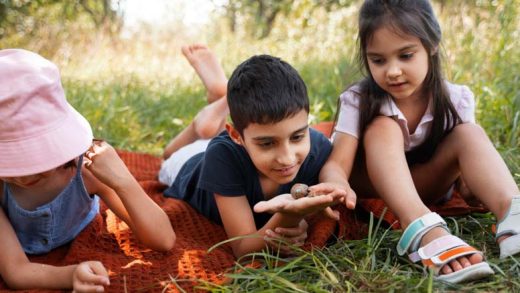Preschool gardening projects and outdoor exploration are excellent methods to engage young minds with the enchantment that nature has always held. Gardening projects for preschoolers are a great way to spark their creativity, cultivate a love of the outdoors, and impart valuable life lessons. Just picture a bunch of toddlers huddled together, astonished as they see a little sprout emerge from the ground for the first time. Interesting, right? Overwhelming, too!
So, why wait? Let’s set out on this delightful journey of amazement and exploration through nature and gardening!
What is the Importance of Gardening for Preschoolers?
- Promoting a Relationship with Nature
- Developing Responsibility and Patience
- Improving Coordination and Fine Motor Abilities
It’s imperative to re-establish a connection with nature given the busy pace of modern life. For young toddlers who are still developing their worldview, they should know the importance of gardening. They can observe the beauty of growth, the changing of the seasons, and the interdependence of all life through immersive gardening projects for preschoolers. They get a profound respect for the natural world around them as they get their hands dirty in the dirt, plant seeds, and watch the small sprouts grow.
Important life lessons that are difficult to convey through conventional teaching techniques are taught through gardening activities for students. As preschoolers water, nurture, and take care of their plants regularly, they develop patience and an understanding of the value of responsibility. These practical encounters foster a feeling of pride in their achievements and ownership.
You can make them participate in complex gardening activities for students’ chores such as planting seeds, moving seedlings, and pulling weeds. They improve their hand-eye coordination and fine motor abilities by participating in these activities. It’s an amazing approach for them to improve their dexterity while having fun outside.
Take a look at our list of kid-friendly gardening tasks below
We have compiled a fun list of toddler-friendly outdoor activities for people who have younger children to enjoy the benefits of gardening.
- Pot up colourful containers
- Make a fairy garden
- Construct a herb garden inspired by dinosaurs
- Construct a teepee out of branches
- Make a pond in a pot
- Make hanging tin-can planters
These rapid container displays take up little room when planted, and they fill up quickly. Allow your children to select plants from the garden centre’s seasonal exhibits, then use a colourful pot to go with them. If your children are old enough, they could assist you with choosing a coloured plastic pot or painting a terracotta pot with vibrant paint. Make sure the base has drainage holes, then fill it two-thirds full with peat-free multipurpose compost. Take the plants out of their pots and arrange them in an eye-catching arrangement on the compost. Add extra compost to the area surrounding the roots and firmly pack it in.
Encourage kids to make an enchanting garden in a ground hollow or beneath a tree and teach them the importance of gardening. Children will enjoy gathering twigs for fences and stones for pathways. You might also include ferns and other little plants around the tree. Assist young children in creating a fairy entrance for a wall or tree by using ribbons tied to branches or painting a piece of cardboard or an ice cream tub lid.
Many components of this project will draw in children. To make the garden extra special for your child, stencil their name into the box and identify the plants with vibrant dinosaurs. Grow foods they will enjoy eating, like strawberries, as well as fragrant herbs, like thyme, to offer an additional sensory element. You’ll need a dinosaur figure for every plant in your pot; just label each plant with its name using a marker pen. Place the exhibit in a bright area and give it regular watering. Gather the fruit and herbs with your kids.
Encourage your children to use branches heaped against a wall, fence, or tree to create an area free of adults. Assist them in positioning the branches to create dense walls that offer seclusion and a gap just large enough for them to squeeze through. Older kids might try building an independent den as well as designing one.
Kids will adore getting wet and dirty in container ponds, especially on a hot summer’s day. They are also quite easy to create. If kids are thinking about how to make a model of a garden for a school project then they should be provided some peaceful time to observe wildlife because they’ll draw birds and insects. Utilise a sizable, shallow container that lacks drainage holes, and fill it with a variety of marginal and pond plants. Additionally, add an oxygenator to aid in maintaining clear water. Place it in partial shade as opposed to direct sunlight, and make sure the water level is maintained.
This recycled tin can vertical planting idea is perfect for kids. Just use a hammer and nail to make holes in each can’s base and one in the top for hanging. After applying various colours, let them dry. After letting the kids choose where to put the pots, hammer the nails in preparation for hanging the cans and let the kids hang the cans from the nails. After letting your children select what to grow in them, put in some compost, and plant the seeds. To keep the plants blooming, ask your kids to help remove dead blooms from the pots and water them every day.
Children learn best through hands-on activities that engage their senses. Gardening projects offer valuable opportunities for preschoolers. They foster skills like observation, problem-solving, and responsibility. Young students love sharing their gardening experiences with classmates.
Make your children involved in gardening projects and let them explore nature. We at Kangaroo Kids International Preschool try to develop a strong bond between preschoolers and nature to build the foundation for holistic growth. To learn more about our curriculum, contact us today!









